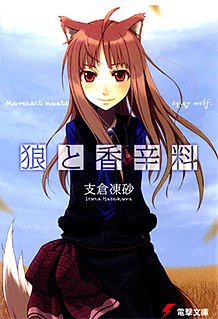| Look up sylph in Wiktionary, the free dictionary. |
A sylph is a mythological creature in western tradition.
Contents
Sylph may also refer to:
| Look up sylph in Wiktionary, the free dictionary. |
A sylph is a mythological creature in western tradition.
Sylph may also refer to:
| This disambiguation page lists articles associated with the title Sylph. If an internal link led you here, you may wish to change the link to point directly to the intended article. |

Shojo Beat is a shōjo manga magazine formerly published in North America by Viz Media. Launched in June 2005 as a sister magazine for Shonen Jump, it featured serialized chapters from six manga series, as well as articles on Japanese culture, manga, anime, fashion and beauty. After its initial launch, Shojo Beat underwent two redesigns, becoming the first English anthology to use the cyan and magenta ink tones common to Japanese manga anthologies. Viz launched a related imprint of the same name for female-oriented manga, light novels and anime.
VIZ Media LLC is an American manga publisher, anime distributor and entertainment company headquartered in San Francisco, California. It was founded in 1986 as VIZ LLC. In 2005, VIZ LLC and ShoPro Entertainment merged to form the current VIZ Media LLC, which is owned by Japanese publishing conglomerate Hitotsubashi Group, which includes Shueisha, Shogakukan and Shogakukan-Shueisha Productions (ShoPro). As of 2017, Viz Media is the largest publisher of graphic novels and comic books in the United States, with a 23% share of the market.

Monthly Dengeki Comic Gao!, also known as Dengeki Gao! as was a Japanese shōnen manga magazine that primarily contained manga and information about series featuring bishōjo characters. It was published from December 1992 to February 2008 by MediaWorks. The Gao in the magazine's title is a childish form of the sound Grr. Many manga serialized in Dengeki Comic Gao! were adapted from light novels published under MediaWorks' Dengeki Bunko label. The magazine was sold every month on the twenty-seventh.

Monthly Comic Dengeki Daioh is a Japanese shōnen manga magazine published by ASCII Media Works under the Dengeki brand. Many manga serialized in Dengeki Daioh were later published in tankōbon volumes under ASCII Media Works' Dengeki Comics imprint. The magazine is sold every month on the 27th. A yonkoma section of Dengeki Daioh called Dengeki Yonkoma Daioh (電撃4コマ大王) features various omake strips of the manga series published in it. The format is typically a normal drawing on the right side featuring one or sometimes more characters, and a vertical four panel strip on the left featuring characters from the associated series in super deformed form. Two special editions of the magazine called Dengeki Moeoh and Dengeki Daioh Genesis are sold bimonthly and quarterly, respectively.

Shakugan no Shana, also known simply as Shana (シャナ), is a Japanese light novel series written by Yashichiro Takahashi with illustrations by Noizi Ito. ASCII Media Works published 26 novels from November 2002 to November 2012 under their Dengeki Bunko imprint. The story focuses on Yuji Sakai, a high school boy who inadvertently becomes involved in an age-old conflict between forces of balance and imbalance in existence. In the process, he befriends a fighter for the balancing force and names her "Shana". The series incorporates fantasy and slice of life elements into its tale.

Ballad of a Shinigami, subtitled Momo: The Girl God of Death, is a Japanese light novel series written by K-Ske Hasegawa, with illustrations by Nanakusa. The series includes twelve novels released between June 10, 2003 and April 10, 2009, published by ASCII Media Works under their Dengeki Bunko imprint. The novels were licensed by Seven Seas Entertainment for release in English with the first novel released in March 2008. The series revolves around Momo, a shinigami, and her familiar Daniel, a talking black cat, as they interfere with the world of the living.

Venus Versus Virus is a Japanese manga series created by Atsushi Suzumi which was first serialized on June 27, 2005 in MediaWorks' shōnen manga magazine Dengeki Comic Gao!. The manga ended serialization in Dengeki Comic Gao! on February 27, 2008 due to the magazine's discontinuation, but the manga continued serialization in ASCII Media Works' manga magazine Dengeki Daioh between March 21 and July 26, 2008. Eight bound volumes have been released by ASCII Media Works in Japan. The manga has been licensed for English language distribution by North American–based company Seven Seas Entertainment; the first volume was released in July 2007. Later, a drama CD was created based on the manga series in October 2006. The series has since been adapted into an anime produced by Studio Hibari that aired in Japan between January and March 2007 on BS-i, containing twelve episodes.

Lillia and Treize is a Japanese light novel adventure series written by Keiichi Sigsawa, with illustrations by Kohaku Kuroboshi, starring the children of the characters from Allison. There are six light novels in the series, published by MediaWorks under their Dengeki Bunko label. The first novel was released on March 10, 2005, and the last novel was published on April 10, 2007; there are three stories in the six volumes, with each story taking up two volumes. The series was followed by Meg and Seron. A manga adaptation by Hiroki Haruse was serialized in the shōjo manga magazine Comic Sylph, also published by MediaWorks, between December 9, 2006 and November 22, 2008 and compiled in two volumes. An anime adaptation aired between April and October 2008 based on both the Allison and Lillia and Treize novels, known as Allison & Lillia.

Spice and Wolf is a Japanese light novel series written by Isuna Hasekura, with illustrations by Jū Ayakura. ASCII Media Works has published 21 novels since February 2006 under their Dengeki Bunko imprint. ASCII Media Works reported that as of October 2008, over 2.2 million copies of the first nine novels have been sold in Japan. The series has been called a "unique fantasy" by Mainichi Shimbun due to the plot focusing on economics, trade, and peddling rather than the typical staples of fantasy such as swords and magic. Yen Press licensed the light novels and is releasing them in English in North America. ASCII Media Works has published three volumes of a spin-off light novel series titled Wolf and Parchment since September 2016.

Dengeki Comics is a manga publishing label affiliated with the Japanese publishing company ASCII Media Works and is aimed at a male audience. Aside from the main Dengeki Comics label, there is the related Dengeki Comics EX label, which was launched in 1992, and the Dengeki Comics NEXT label, which was launched in 2013. A large amount of the manga published under Dengeki Comics was originally serialized in the manga magazine Dengeki Daioh.
The Dengeki Comic Grand Prix is an award handed out semiannually and annually by the Japanese publisher ASCII Media Works for original one-shot manga. Between the first and fifth contests held, there were two divisions: original and anthology. This was changed with the sixth contest to a Daioh/Gao! division which covered shōnen manga, and a Sylph division which covered shōjo manga. Between the seventh and twelfth contests, the two divisions were changed to simply shōnen and shōjo manga. Starting with the 13th contest in 2011, a seinen manga division was added. There are three types of prizes given out each contest: the Grand Prix Prize, the Semi-Grand Prix Prize, and the Excellence Prize. The Grand Prix Prize has only been handed out four times in the contest's history: in 2004, 2005, 2010 and 2012. There was also once a Dengeki Moeoh Grand Prize division which was held twice with a Grand Prize and Honorable Mentions.

ASCII Media Works, formerly ASCII Media Works, Inc., is a Japanese publisher and brand company of Kadokawa Future Publishing headquartered in Nishi-Shinjuku, Shinjuku, Tokyo, Japan. It originally formed on April 1, 2008 as a result of a merger between ASCII Corporation and MediaWorks where MediaWorks legally absorbed ASCII. Despite this, the former president and CEO of ASCII, Kiyoshi Takano, became the first president and CEO of ASCII Media Works. It became an internal division of Kadokawa Corporation on October 1, 2013.

Sylph is a defunct Japanese shōjo manga magazine published by ASCII Media Works and is sold monthly. The magazine was originally published on December 9, 2006, as a special edition version of MediaWorks' now-defunct Dengeki Comic Gao! under the title Comic Sylph as a quarterly publication. On March 21, 2008, with the release of the sixth volume, the magazine was transferred over as a special edition version of ASCII Media Works' shōnen manga magazine Dengeki Daioh. On May 22, 2008, the magazine became independent of Dengeki Daioh and was published as volume one of Sylph as the July 2008 issue as a bimonthly publication. On May 22, 2010, the magazine started to be published monthly. Sylph is one of the few magazines originally published by MediaWorks not under the Dengeki naming line, such as with Dengeki Daioh, and Dengeki G's Magazine, the first of which being Active Japan in 1995 which has been discontinued since 1998.
MediaWorks, Inc. was a Japanese publishing company in the Kadokawa Group known for their Dengeki brand magazines and book labels. These included such well-known magazines as Dengeki Daioh, and Dengeki G's Magazine, along with MediaWorks' main light novel publishing imprint Dengeki Bunko. The company was merged with ASCII on April 1, 2008, and became ASCII Media Works. They mainly catered to the Japanese male otaku crowd, covering such topics as anime, light novels, manga, plastic modelling, and visual novels. However, MediaWorks had published three magazines targeted towards females—Comic Sylph, Dengeki Girl's Style, and Character Parfait—but each one was a special edition version of another magazine. MediaWorks ran yearly contests for original novel and manga submissions, such as the light novel Dengeki Novel Prize contest.
Shizuru Hayashiya is a Japanese manga artist. She is best known for her Hayate × Blade series which is licensed in English by Seven Seas Entertainment, and the manga adaptation of the anime Please Teacher!.

Accel World is a Japanese light novel series written by Reki Kawahara and illustrated by HiMA. The series began publication in ASCII Media Works' Dengeki Bunko imprint from February 2009 and is licensed in North America by Yen Press. Two manga series began serialization in Dengeki Bunko Magazine from May 2010, with another series beginning serialization in Dengeki Daioh in January 2013. An anime adaptation by Sunrise aired in Japan between April and September 2012. An English-language version began streaming on Viz Media's Neon Alley service from April 2013. Two video games were released for the PlayStation Portable and PlayStation 3 on September 13, 2012, and January 31, 2013, each containing an original video animation episode. An anime film titled Accel World: Infinite Burst featuring an original story by Kawahara premiered in Japan on July 23, 2016.
Shueisha Inc. is a Japanese company headquartered in Chiyoda, Tokyo, Japan. The company was founded in 1925 as the entertainment-related publishing division of Japanese publisher Shogakukan. The following year, Shueisha became a separate, independent company.

Shōjo, shojo, or shoujo manga is manga aimed at a teenage female target-demographic readership. The name romanizes the Japanese 少女 (shōjo), literally "young woman". Shōjo manga covers many subjects in a variety of narrative styles, from historical drama to science fiction, often with a focus on romantic relationships or emotions.

Eromanga Sensei (エロマンガ先生) is a Japanese light novel series written by Tsukasa Fushimi and illustrated by Hiro Kanzaki. ASCII Media Works has published nine volumes in the series under its Dengeki Bunko imprint since December 2013. A manga adaptation illustrated by Rin began serialization in Dengeki Daioh in May 2014. An anime adaptation produced by A-1 Pictures aired from April to June 2017.